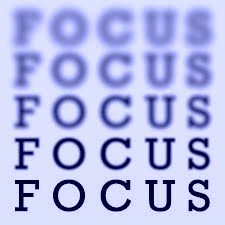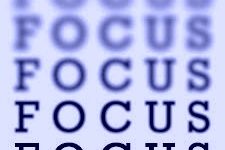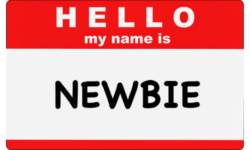Some of you may remember a rock song from 1970 with the lyrics “War! What is it good for? Absolutely nothing!”. You could feel the same way about visual blur, that it has no redeeming value. Why are your eyes and the visual part of your brain making you suffer like this?
The body gets our attention with pain or discomfort. It has no other way to communicate that you’re doing something which is harmful to its functioning. Maybe you’ve been skimping on your sleep and working late, rarely taking a break from the computer, and drinking too much coffee to push yourself to be more productive when you’re exhausted. Part of you knows this behavior isn’t good for you, but you have a deadline you’re trying to meet. So the blur rises up at the end of a long tiring day. Great, you think sarcastically. Do I need eyeglasses (or stronger ones) now?

Probably not. If you didn’t feed your toddler for 5 or 6 hours, you wouldn’t be surprised if she was hungry, probably crying and wanting you to take care of her. It’s the same with your eyes. Our human biology was not designed to look at a computer screen for hours without a break. We need variety in our seeing, to look close, to look far, to look up and down and to the left and right, to look at colors and depth, and to spend time resting our eyes and not looking at all, which we can practice with palming.
Just like the rest of our body, our eyes also need healthy food, regular exercise to get the blood flowing and to “get the gunkies out” as a child friend of mine likes to say, enough restful sleep, and being with friendly people. All this will lead to a naturally happy attitude most of the time, as well as to healthier vision. What is your blur telling you that your eyes need? If you get quiet and tune in to yourself, I’ll bet you already know the answer. Give your eyes what they’re asking for, which might just be more play time! They’ll reward you with clearer more effortless vision.
I wore strong glasses, then contact lenses, from age 5 into my 40s. While making many mistakes, eventually l learned how to improve the way I use my eyes and to see in a more relaxed, healthy manner. It is my pleasure to coach others to do the same. Visit me at https://NancyLNeff.com.


Yes. Very true. I think what did it for me (accepting the blur as a legitimate state/message while trying to gently work with it) was that supercute illustration “make friends with the blur” in Janet Goodrich’s “Natural Vision Improvement”. I can wholeheartedly recommend both the book as well as that particular chapter!
Roman, yes, Janet Goodrich made a big contribution. And many of us find that, contrary to what you’d expect, fighting the blur and trying to attack it just exhausts us, plus we don’t make much pr0gress.